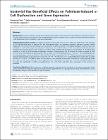| dc.contributor.author | O'Driscoll, Lorraine | en |
| dc.date.accessioned | 2014-10-14T15:31:46Z | |
| dc.date.available | 2014-10-14T15:31:46Z | |
| dc.date.issued | 2012 | en |
| dc.date.submitted | 2012 | en |
| dc.identifier.citation | Chen X, Hermansen K, Xiao J, Bystrup SK, O`Driscoll L, Jeppesen PB., Isosteviol has beneficial effects on palmitate-induced cell dysfunction and gene expression., PLoS One, 7, 3, 2012, 34361 - 34369 | en |
| dc.identifier.other | Y | en |
| dc.identifier.uri | http://hdl.handle.net/2262/71512 | |
| dc.description | PUBLISHED | en |
| dc.description.abstract | BACKGROUND:
Long-term exposure to high levels of fatty acids impairs insulin secretion and exaggerates glucagon secretion. The aim of this study was to explore if the antihyperglycemic agent, Isosteviol (ISV), is able to counteract palmitate-induced α-cell dysfunction and to influence α-cell gene expression.
METHODOLOGY/PRINCIPAL FINDINGS:
Long-term incubation studies with clonal α-TC1-6 cells were performed in the presence of 0.5 mM palmitate with or without ISV. We investigated effects on glucagon secretion, glucagon content, cellular triglyceride (TG) content, cell proliferation, and expression of genes involved in controlling glucagon synthesis, fatty acid metabolism, and insulin signal transduction. Furthermore, we studied effects of ISV on palmitate-induced glucagon secretion from isolated mouse islets. Culturing α-cells for 72-h with 0.5 mM palmitate in the presence of 18 mM glucose resulted in a 56% (p<0.01) increase in glucagon secretion. Concomitantly, the TG content of α-cells increased by 78% (p<0.01) and cell proliferation decreased by 19% (p<0.05). At 18 mM glucose, ISV (10(-8) and 10(-6) M) reduced palmitate-stimulated glucagon release by 27% (p<0.05) and 27% (p<0.05), respectively. ISV (10(-6) M) also counteracted the palmitate-induced hypersecretion of glucagon in mouse islets. ISV (10(-6) M) reduced α-TC1-6 cell proliferation rate by 25% (p<0.05), but ISV (10(-8) and 10(-6) M) had no effect on TG content in the presence of palmitate. Palmitate (0.5 mM) increased Pcsk2 (p<0.001), Irs2 (p<0.001), Fasn (p<0.001), Srebf2 (p<0.001), Acaca (p<0.01), Pax6 (p<0.05) and Gcg mRNA expression (p<0.05). ISV significantly (p<0.05) up-regulated Insr, Irs1, Irs2, Pik3r1 and Akt1 gene expression in the presence of palmitate.
CONCLUSIONS/SIGNIFICANCE:
ISV counteracts α-cell hypersecretion and apparently contributes to changes in expression of key genes resulting from long-term exposure to palmitate. ISV apparently acts as a glucagonostatic drug with potential as a new anti-diabetic drug for the treatment of type 2 diabetes. | en |
| dc.format.extent | 34361 | en |
| dc.format.extent | 34369 | en |
| dc.language.iso | en | en |
| dc.relation.ispartofseries | PLoS One | en |
| dc.relation.ispartofseries | 7 | en |
| dc.relation.ispartofseries | 3 | en |
| dc.rights | Y | en |
| dc.subject | Fatty acids | en |
| dc.subject | Gene expression | en |
| dc.subject | Glucagon | en |
| dc.subject | Glucose | en |
| dc.subject | Insulin | en |
| dc.subject | Insulin secretion | en |
| dc.subject | Secretion | en |
| dc.title | Isosteviol has beneficial effects on palmitate-induced cell dysfunction and gene expression. | en |
| dc.type | Journal Article | en |
| dc.contributor.sponsor | Danish Medical Research Council | en |
| dc.type.supercollection | scholarly_publications | en |
| dc.type.supercollection | refereed_publications | en |
| dc.identifier.peoplefinderurl | http://people.tcd.ie/lodrisc | en |
| dc.identifier.rssinternalid | 92852 | en |
| dc.identifier.doi | 10.1371/journal.pone.0034361 | en |
| dc.rights.ecaccessrights | openAccess | |
| dc.relation.source | http://www.ncbi.nlm.nih.gov/pubmed/22479612 | en |
| dc.subject.TCDTheme | Cancer | en |
| dc.subject.TCDTheme | Genes & Society | en |
| dc.subject.TCDTag | Metabolic syndrome & diabetes | en |
| dc.identifier.rssuri | http://www.ncbi.nlm.nih.gov/pubmed/22479612 | en |
| dc.identifier.orcid_id | 0000-0002-9860-8262 | en |




